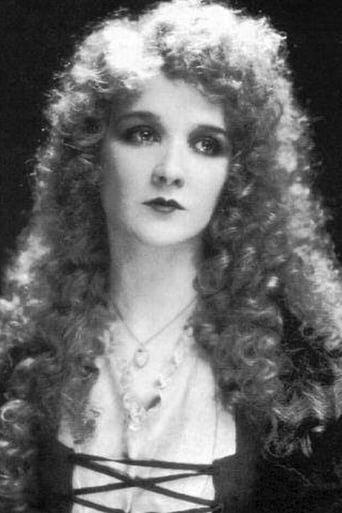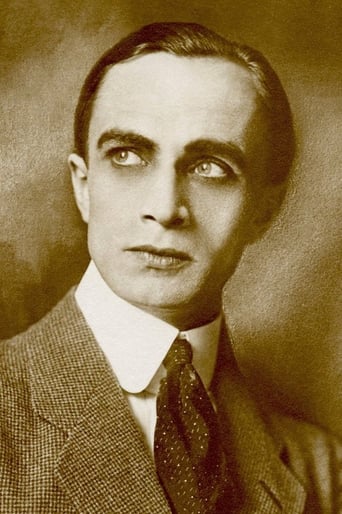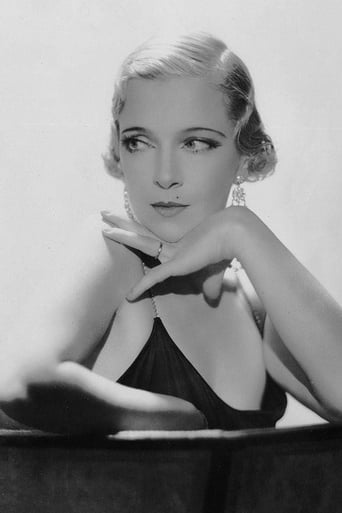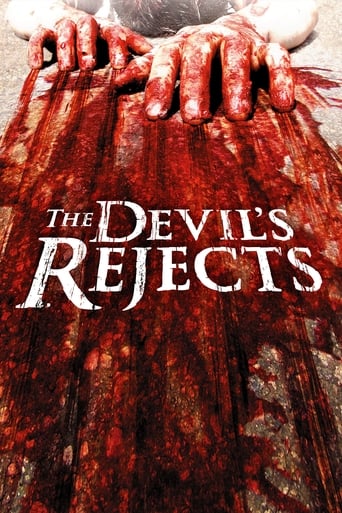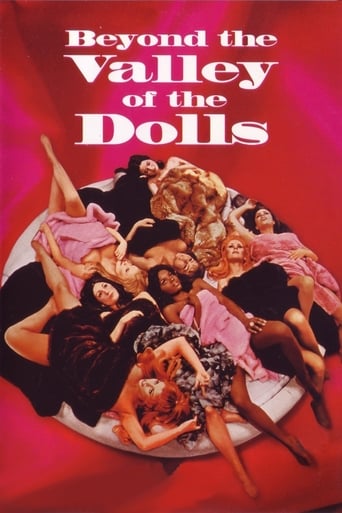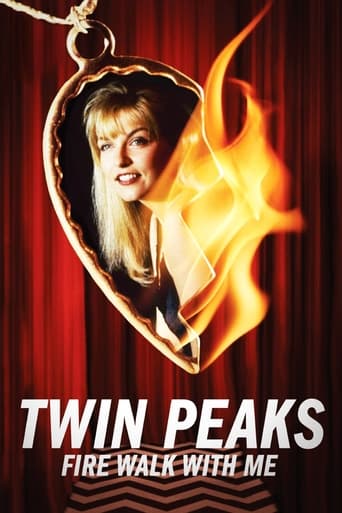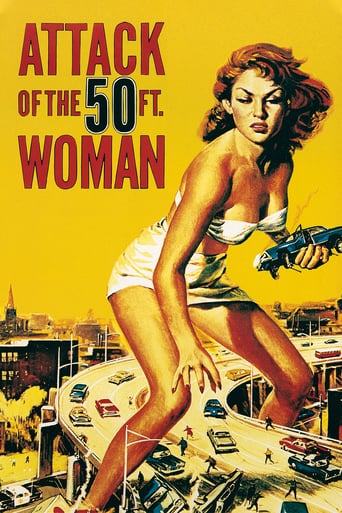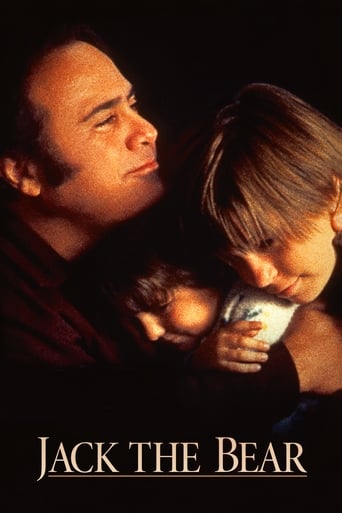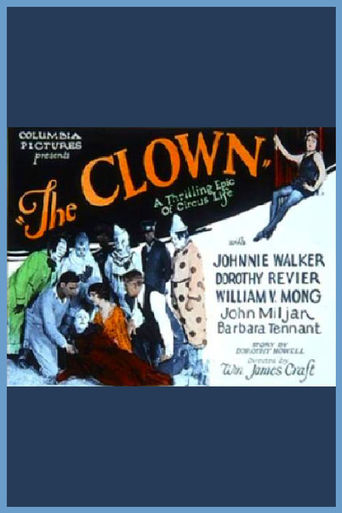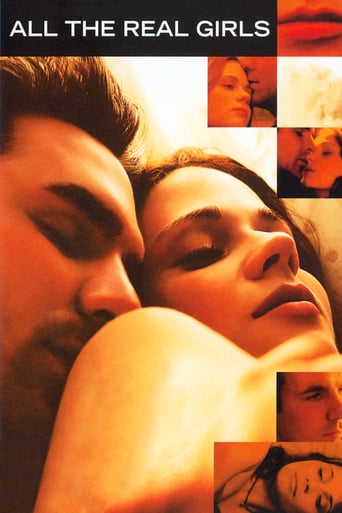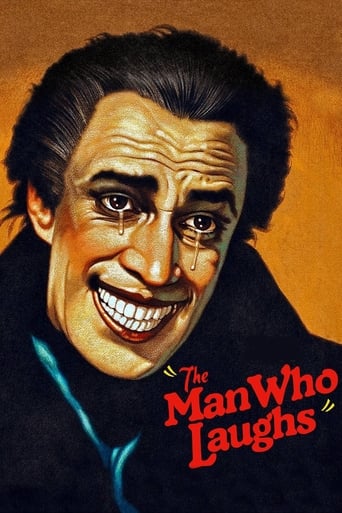
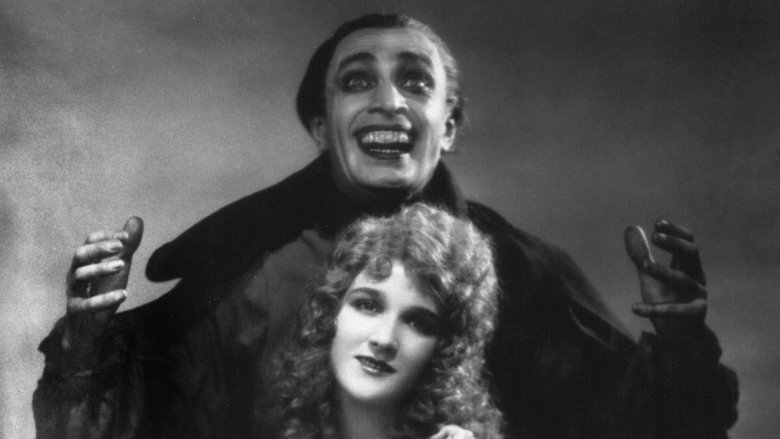
The Man Who Laughs (1928)
Gwynplaine, son of Lord Clancharlie, has a permanent smile carved on his face by the King, in revenge for Gwynplaine's father's treachery. Gwynplaine is adopted by a travelling showman and becomes a popular idol. He falls in love with the blind Dea. The king dies, and his evil jester tries to destroy or corrupt Gwynplaine.
Watch Trailer
Cast


Similar titles
Reviews
Whenever there is someone needed to play the role of a mutilated or disfigured man I automatically think of the man of a 1000 faces Lon Chaney. But this time the title role is played by the German actor Conrad Veidt. I have seen Veidt in other great roles as Cesare in The Cabinet of Dr. Caligari and as Orlac in Orlac's Hands. That he would pull of a convincing Gwynplaine was in no doubt. He didn't disappoint and neither did Mary Philbin as the blind Dea. I already loved her in The Phantom of the Opera. She really is fitting for the role as fragile girl. But most kudos to Veidt, it must have been hard to have your face in a constant grin. Despite this permanent smile it was still possible to read Gwynplaine's real feelings, even when sad. I think only great silent stars as Veidt or Chaney could have pulled this of. That's why I love silent movies as the focus is so much on expression. The movie is filled with some exciting scenes just like the silent version of the Hunchback of Notre Dame with what seems a faithful setting of the England of the 17th century. The costumes seem to fit the time period. The story is gripping, tension until the very end even if it's a sentimental sweet ending I thought it was great. I also need to applaud Olga Baclanova for playing the licentious duchess and the dog who played Homo. I really loved the scene when Homo tries to lead Dea to her beloved Gwynplaine. And not to forget Brandon Hurst as Barkilphedro, wow he really has the face for playing such a mean character.
THE MAN WHO LAUGHS (1928) is the tale of Gwynplaine (Conrad Veidt), who was disfigured as a boy as retaliation for his father's refusal to pay obeisance to King James II. With a blind foundling, Dea (Mary Philbin), he grows up to become a traveling performer. Gwynplaine is involved in court intrigue when an evil jester discovers his existence and plots an arranged marriage to control Gwynplaine's fortune as the heir to a lord. Directed by Paul Leni.THE MAN WHO LAUGHS movingly portrays Gwynplaine's plight as a man who is marginalized by society. His disfigurement controls his life in many ways. Crowds laugh at Gwynplaine for his appearance, and he feels that no woman can love him because of his face (except for the blind Dea). The script touchingly conveys the love between Gwyplaine and Dea, who only sees the inner man. However, I felt that the exposition lacked clarity when the story dealt with Barkilphedro the jester's intrigue and the reasons for the arranged marriage. Was the jester planning to kill Gwynplaine and take the money as his own? His motivations are not fully clarified, except for the fact that he is evil. On the other hand, maybe it was a plan to rectify things for Gwynplaine. I wasn't sure. The narrative drags a bit in places but comes to a pretty epic and satisfying conclusion.As far as the performances go, Conrad Veidt is compelling as Gwynplaine, haunting and expressive even though required to hold his face in the contorted laugh to which the title alludes. Veidt is compelling, emotive and unforgettable in his role. For much of her role Mary Philbin doesn't get to do much other than smile and look pretty, but she does realistically portray a blind woman, a definite acting challenge. She does best in her scenes with Veidt. Olga Baclanova is very charismatic as Duchess Josiana, alluring, flirtatious and imperious. Cesare Gravina, who plays Ursus, the philosopher who takes Gwynplaine in, overacts in the Grand Guignol style, something that would be practically obliterated from film about two years later when the switchover to talking film was finally complete. The production is moody and evocative in the German Expressionist style, using light and shadow, as well as camera angles, to heighten the feeling of the film. I was able to watch the original version with a synchronized sound track. The music was appropriately vivid, and sound effects were added liberally to the score – especially crowd noise and clanging objects at the fair. This can be rather jarring at times, since these effects often play alongside the music, even during love scenes! However, it is an interesting artifact of the pre-talkie era, as Hollywood was learning how to incorporate recorded music into movies. Overall, the story was moving when it came to Gwyplaine's plight, although somewhat muddy when dealing with the intrigue. Conrad Veidt and Olga Baclanova give compelling performances, with good support from Mary Philbin, and the style of the movie is quite intriguing. A fine movie from the late silent era. SCORE: 8/10
Where people say that smiling is the best cure for sadness, there's never been a story like this that takes a nice and joyful smile that everybody loves to see and make into a curse for a man for the rest of his years. Based on Victor Hugo's 1869 novel L'Homme qui Rit, The Man Who Laughs starred German import Conrad Veidt as Gwynplaine, a carnival freak doomed to live life wearing a perpetual grin carved on his face by Dr Hardquannone (George Siegman because his father, Lord Clancharlie (Allan Cavan), had offended England's King James II (Sam De Grasse). Taken in as a child by Ursus, a mountebank (Cesare Gravina), Gwynplaine grows up alongside the beautiful but blind Dea (Mary Philbin). They fall in love but Gwynplaine refuses to marry her because his hideous face makes him feel unworthy. Queen Anne (Josephine Crowell), meanwhile, has ascended the throne and when she learns from her predecessor's evil jester Barkilphedro (Brandon Hurst) that the recalcitrant Duchess Josiana (Olga Baclanova) is in possession of Lord Clancharlie's estates, she decrees that the royal femme fatal must marry Gwynplaine, the rightful heir. Josiana, who has caught Gwynplaine's act incognito and arranged a rendezvous, is at the same time sexually attracted to and repelled by the "Laughing Man," but Gwynplaine, who realizes that the duchess' attraction has legitimized his right to love Dea, renounces his title and follows his heart to the new World. We have seen many movies and stories where we have seen different kind of extraordinary people and the usual people give out a smile, good or bad, like a superhero users a smile to welcome people of the city and show that he comes in peace, but a villain gives out a smile when his doing something wrong or just loves playing bad. But what about a story about man that has a very usual gift that he views it as a curse, that not everybody as thought off before, even I didn't thought of it. His not a bad guy and his not a hero as well, his just a guy trying to make the best out of life but the smile that sticks on his face that courses all this attention really gives Gwynplaine (Main character) a hard and difficult life. The Man Who Laughs is a silent film that very cleverly get's it's message and it's story across very well and this a silent film with no sound at all and I still felt emotional for the character's in the film.Conrad Veidt played Gwynplanie and through out the film he had a lot of make-up on his face for the effect of the big smile for his character; it must have been really difficult for him to show any emotion by all that make-up, but he nailed it by showing as much emotion as he can by simply his eyes which people say "The eyes are the windows to the soul", and I felt it all that in his eyes, just like Bane from The Dark Knight Rise who had a mask that covered half of his face and still can be scary and the kind of guy that nobody mess with, all by his eyes and Conrad Veidt also did the same thing.All the cast did a great job in their roles and Olga Baclanova can play a right nasty bitch but she did it really well. The directing is really good allowing some really impressive and heart felt moments that the cast and the director got right.My only my problems with the film is that at times it dragged a little bit in some parts, and that's really it for problems.Overall The Man Who Laughs is a freaking fantastic movie with scenes that really played with my heart strings.
When Universal found that they had two monumental successes on their hands with "The Hunchback of Notre Dame" and "The Phantom of the Opera", both of whom had for their main characters a being so deformed and hideous, they turned once again to Victor Hugo for what they hoped would be another hit. But Lon Chaney was not available - he had gone to MGM in the meantime and was now established as their top star and they were not about to lend him. The late 1920s saw German expressionism at it's height in Hollywood and the studios at the forefront of the surge were Fox and Universal. So Universal turned to the country of it's founder's birth and in particular a thriller called "Waxworks" to find both a new director, Paul Leni, and a star, Conrad Veidt.The very grim Victor Hugo story is about an outlaw band - the dreaded Comprachicos, whose surgeon roves the country carving huge grotesque grins onto young children's faces, forcing them to grow up to become side show freaks. There are some chilling images in the prologue where Gwynplaine, as a child, wanders among bodies and human bones hanging from scaffolds as a blizzard whips up. The little boy then finds the blind Dea clasped in her dead mother's arms. The England that Paul Leni has conjured up is a bleak and haunted world.As the years go on Gwynplaine (Veidt) becomes the "laughing man", a strolling player in the troupe of Father Ursus (Cesare Gravina), the one person who didn't turn his back on the orphans, but to Dea (beautiful Mary Philbin), who cannot see his hideous grin, he will always be goodness and light. Chaney could not have bettered Veidt's performance in which his eyes are truly the windows to his soul. At Southwark Fair, one of the sideshow proprietors (George Siegman, a Griffith regular) realises that Gwynplaine is the missing heir to Lord Clancharlie's estates, now taken over by the seductive Duchess Josiana and the ambitious Barkiphedro who had Gwynplaine's father tortured and killed in the "Iron Lady" over 20 years before. Olga Baclanova is just a sensation - the censor must have been asleep - she has two nude scenes within her first introduction and she plays a Countess who loves nothing better than donning dirty peasant rags and mingling (and allowing them to take great liberties) with the ruffians down at the fair.The last part of the film is very Griffith influenced ("Orphans of the Storm"). Gwynplaine's castle and land have rightfully been restored to him but he is being forced into marriage with the lustful Josiana. Dea (like the blind Louisa in "Orphans") is thwarted at every turn until she and Ursus are forced from the city by the power hungry Barkiphedro, then it is Gwynplaine's turn to race through the town. His head was turned by Josiana and in the scene where she strips away his mask and, displaying both lust and loathing, kisses his deformed mouth, there is so much sensuality and passion in her performance, a reviewer at the time commented that "she burns holes in the screen".The Kino release that I have features a restored orchestral Movietone soundtrack, complete with a theme song "When Love Comes Stealing" that they may have hoped would be as popular as "7th Heaven's" "Diane" - but it wasn't.


